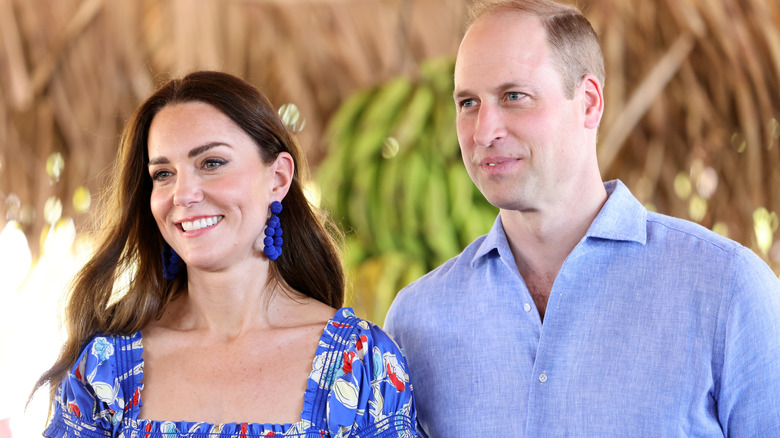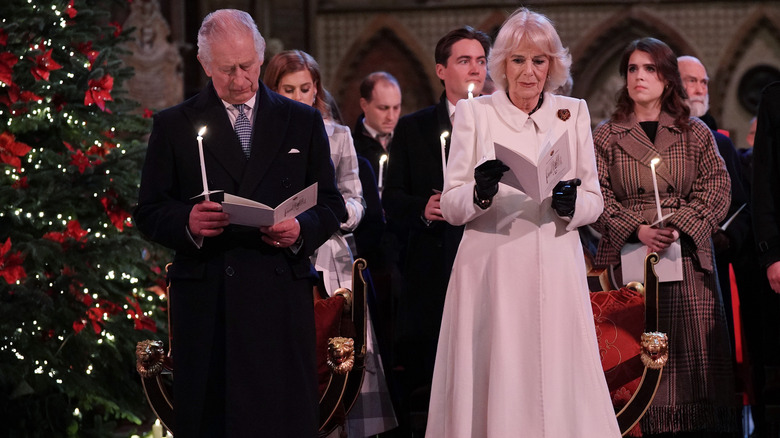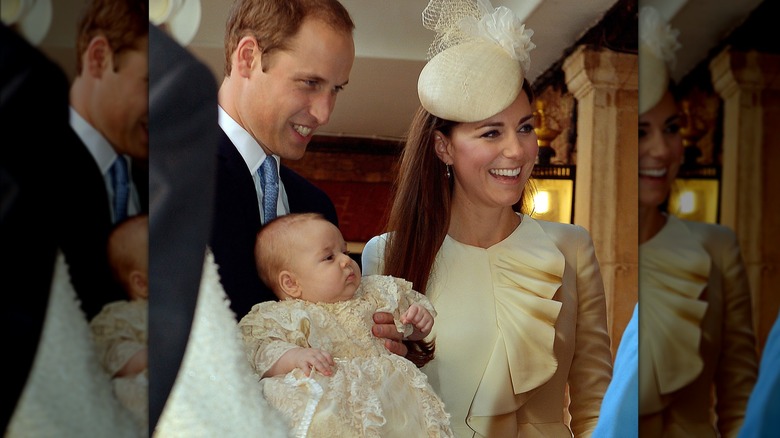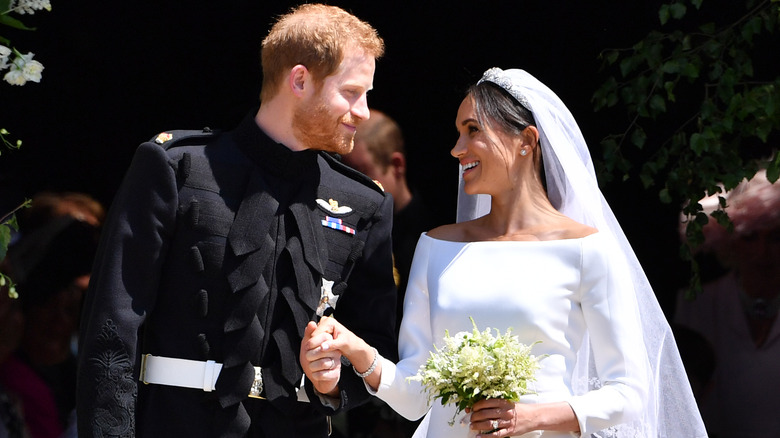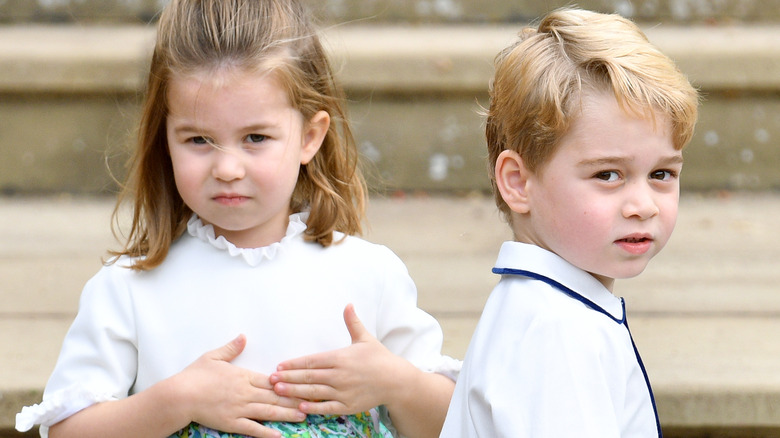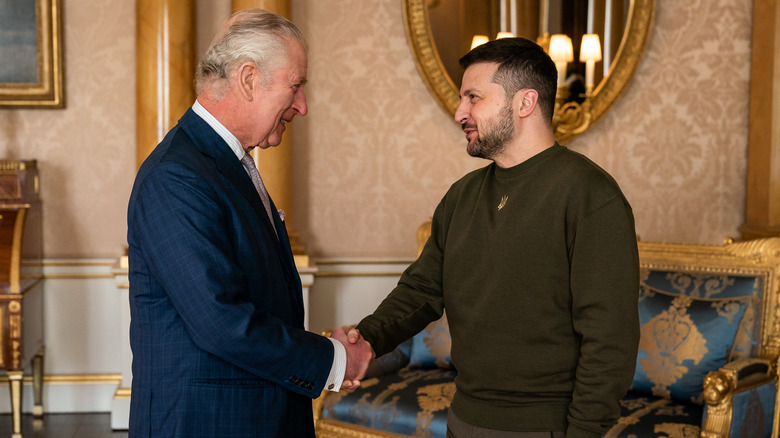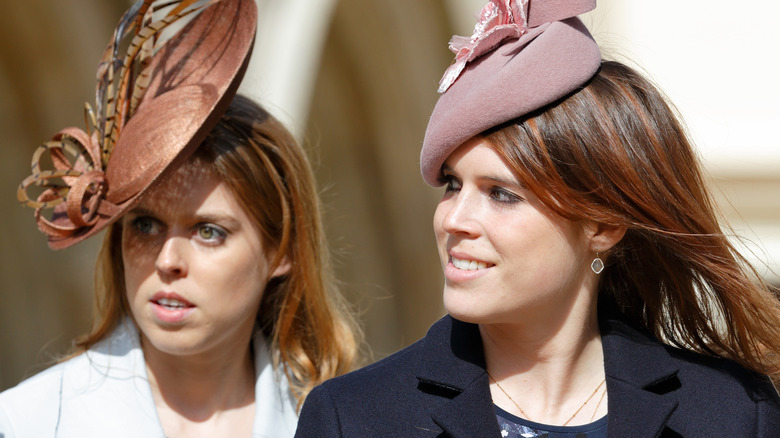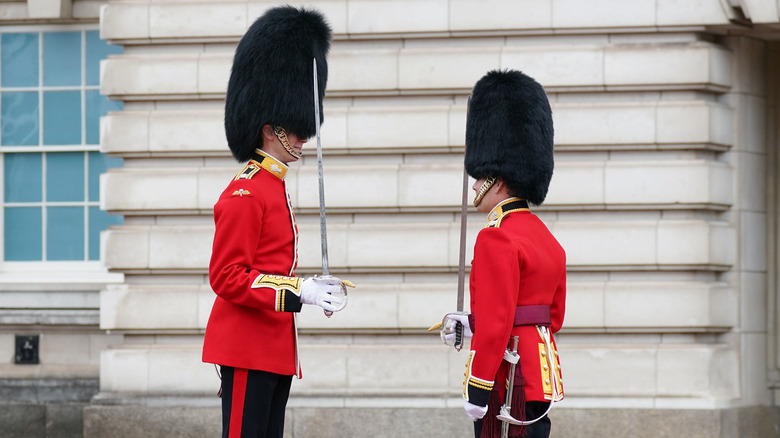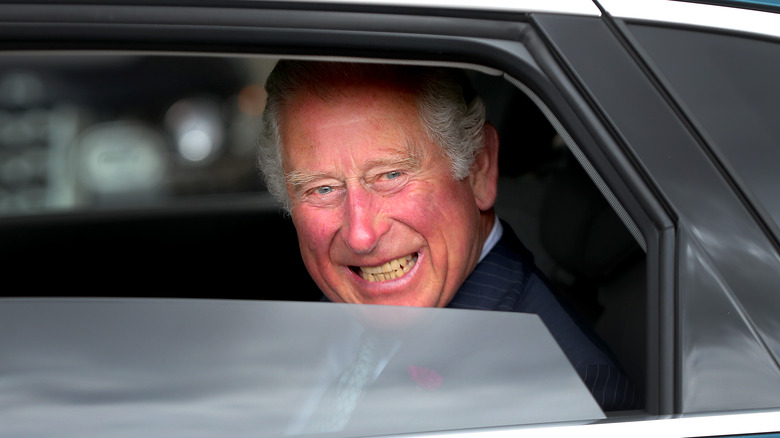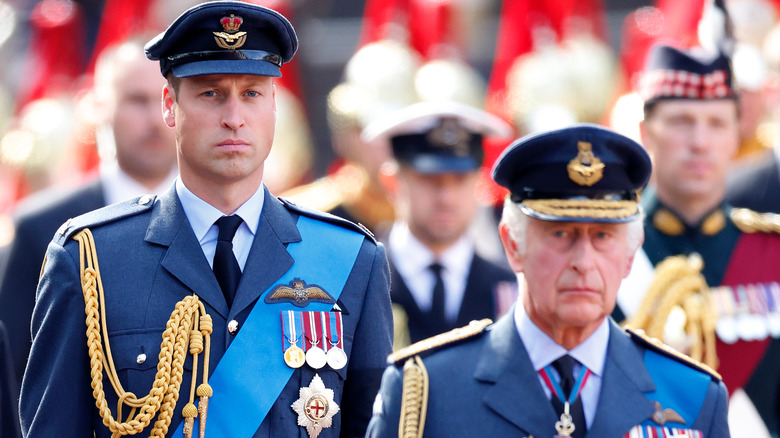Royal Family Traditions That May Not Survive The Next Generation
Much of the appeal of the British royal family lies in its pomp and majesty steeped in centuries-old traditions. Bejeweled tiaras, ball gowns, and grandiose gatherings still play such a huge part in royal custom. Indeed, there's a reason why period shows like "Bridgerton" have scored millions of views and inspired themed events in which folks can pretend to be regal old money fashionistas for the day. But as fun as the concept of regality is, the fact remains that there are myriad aspects to the royal family that may be considered antiquated at best (while some enduring royal traditions are just plain weird).
When King Charles III ascended the throne in September 2022, there were reports that he planned to modernize the monarchy. Namely, there was speculation that he would cut public funding, such as not housing less senior royals. "A lot of practices that have evolved over time will be changing," an insider told the Evening Standard. "The King is not heartless, but for family members who are not part of the core family working for the crown, it is fair for them to house themselves."
But critics argue that Charles has failed to make adequate changes to The Firm in line with modern sensibilities. Considering that the first in line to the throne, Prince William, is a millennial, one would expect more than a few tweaks to the current royal status quo from him. Let's look at royal family traditions that may not survive the next generation.
Weigh-ins at Christmas
Royal Christmas traditions range from Sandringham soirees and watching festive flicks, to... being weighed. Yes, that scene in "Spencer" really is grounded in (unpleasant) reality. Every Christmas, royals are weighed to ensure that they are well fed. But weighing guests is problematic for a variety of reasons.
The tradition, which dates back to the reign of Queen Victoria, appears both antiquated and cruel, particularly for those with body image issues. For instance, Princess Diana struggled with bulimia and being weighed no doubt had a detrimental effect on her mental health (as depicted in the aforementioned biopic). "Spencer" screenwriter Steven Knight told Vanity Fair that he was dismayed by, as he put it, "The fact that someone with her condition was coming to a place where you have to be weighed when you arrive." To make matters worse, there are claims that the royals knew Diana had bulimia.
As eating disorder expert Donna Fish explained to Psychology Today, weighing oneself can negatively affect a person's relationship with food. "People tend to get self-critical and very down on themselves if they feel the number is a 'bad number,'" she said. "They tell themselves that from the number that they've 'been bad' and therefore need to get 'in control' and not eat the foods they love." With growing awareness surrounding eating disorders and the rise of body positivity movements, as well as Prince William's own dedication to erasing the stigma around mental illness, it's seems less likely that this tradition will continue into the next generation.
If you need help with an eating disorder, or know someone who does, help is available. Visit the National Eating Disorders Association website or contact NEDA's Live Helpline at 1-800-931-2237. You can also receive 24/7 Crisis Support via text (send NEDA to 741-741).
Mandatory baptisms may be considered outdated in the future
In order to be eligible for the line of succession, royals must be baptized into the Church of England, of which the reigning monarch is also the Supreme Governor. But the UK is a multicultural country, with a diversity of religions other than Anglicanism celebrated. As of 2021, 6.5% of the British population is Muslim, 1.7% Hindu, and 37.2% nonreligious. Although the monarchy has made strides to better reflect Britain's diversity — for example by allowing religious leaders of different faiths to give readings at royal events — the Church of England baptism tradition is still in place.
Graham Smith, CEO of the anti-monarchist organization Republic, told Yahoo! News that he hoped King Charles III would use his coronation as an opportunity to further the separation of church and state. However, no such plans materialized. "How can a head of state be said to be impartial and representing all of us when they are so closely linked to one religion, a religion that is increasingly a minority interest," Smith said.
There have been some changes with regards to the monarchy and religion in recent years. Until 2013, a member of the royal family could not be made monarch if they married a Roman Catholic. While this is no longer true, if the monarch's children were raised Catholic, they still would not be eligible for the throne.
Marriages needing the approval of the monarch
Replacing the Royal Marriages Act 1772, the Succession to the Crown Act came into force in 2015 under the Conservative/Liberal Democrat coalition. "The act puts in place succession laws that are fit for the 21st century and for a modern constitutional monarchy," Deputy Prime Minister Nick Clegg said at the time, per the BBC. The change meant that less senior royals, such as Princess Eugenie, would no longer need the reigning monarch's approval to get married. But such rules still apply to the next six people in line to the throne.
As Prince Harry revealed in Netflix's "Harry & Meghan" documentary (via Vogue), this tradition dictated the time and location of his proposal. "I wanted to do it earlier. Because I had to ask permission from my grandmother, I couldn't do it outside of the UK," he explained. While he went along with the rule, Harry still found it strange. "It didn't make sense. A grown man asking his grandmother for permission to marry?" he wrote in "Spare" (via People).
By the time Prince George is old enough to marry, his paternal grandfather, King Charles III, may feasibly not be alive. This means that the future King William V will have to approve the marriages of not only his own children, but Harry and Meghan's (who by then would have moved up to fifth and sixth in the line of succession). Given the complicated state of his relationship with his brother, the millennial monarch may decide to scrap this rule altogether.
Will future law-breaking monarchs still be able to avoid getting arrested?
As it stands, the reigning monarch of the United Kingdom cannot be arrested and is thus allowed to break the law. In fact, the British monarch is immune from an eye-watering 160 laws. This includes legislation that aims to protect marginalized individuals from discrimination in the workplace, such as the Equality Act 2010. This exemption is particularly jarring considering that Buckingham Palace had previously barred non-white people from working in the royal household up until the late '60s. Moreover, the monarch is also immune from being convicted of committing a hate crime. And, as explained in a blog published by The University of Law, King Charles III is, rather shockingly, exempt from being prosecuted for murder — even if he were to confess.
While King Charles hasn't broken the law, the fact that he is exempt from doing so has led to considerable criticism. "It comes at this big cost," law professor Thomas Adams told The Guardian. "Not only do we say that the monarch can't be prosecuted in accordance with our laws, but we say these are not even laws for our monarch. That causes pretty big problems for our sense of equality before the law."
The notion that an individual is free from criminal prosecution simply due to hereditary privilege certainly appears archaic. Accordingly, this is one royal tradition that is more than likely on its last legs in modern day Britain.
Expressing political views may be more acceptable for future royals
It's been said that both Queen Elizabeth II and the erstwhile Prince Charles loathed the policies of Prime Minister Margaret Thatcher. Charles reportedly believed Thatcher to be callous, leading to The Iron Lady declining an invitation to discuss his outreach initiatives. Similarly, insiders told The Times in 1986 that "the Queen considers the prime minister's approach often to be uncaring, confrontational and socially divisive."
Of course, such sentiments were uttered in private, since royals are supposed to remain politically neutral in public (the queen was reportedly mortified when Thatcher found out what she really thought, leading to an apology from Her Majesty). But with the ever worsening climate crisis and increasing political turmoil around the world, one has to wonder how long the head of state can remain politically impartial.
When Charles became king in 2022, he already began tweaking this tradition. Most notably, he explicitly condemned the Russian invasion of Ukraine, which he called "an unprovoked full-scale attack on their nation" in a statement posted on Instagram in February 2023. He also expressed support for President Volodymyr Zelenskyy, whom he had met earlier in the month at Buckingham Palace, and offered solidarity with Ukrainian refugees forced to flee their homeland. Accordingly, some have argued that the royals are unlikely to remain politically neutral forever. It's therefore quite possible that the future royal generation will take this a step further, perhaps voicing explicit support for political causes or even candidates.
Mandatory hats for women at formal gatherings
Over-the-top hats have become part and parcel of royal pageantry. From those infamous fascinators worn by Princesses Eugenie and Beatrice to Queen Elizabeth II's assortment of colorful cranial adornments, the royals do love their headgear. Or so it seems. "When it comes to a special occasion in British society, the special occasion is not complete without a hat," fashion writer Hilary Alexander told ABC News. But in addition to the crucial class component of mandatory millinery, there is an undeniable gendered aspect to the tradition.
In actuality, women are required to wear hats to certain gatherings, as dictated by longstanding royal protocol. "Up until the 1950s ladies were very seldom seen without a hat as it was not considered 'the thing' for ladies to show their hair in public," etiquette expert Diana Mather told the BBC. Although this rule has been modified and somewhat modernized, with women only being required to wear hats at more formal gatherings these days, this one still seems rather antiquated.
With growing awareness around gender inequality, gendered royal traditions such as this one are unlikely to survive into the next generation. Prince William has proven himself a women's ally, teaching his son to respect his daughter's sporting prowess and even assuring a group of young girls that unrealistic edited photos on social media aren't something to aspire to. As such, we can't imagine the future king, potential feminist monarch extraordinaire, to allow this tradition to continue.
Speaking of headgear, the royal guards still wear bearskin hats
Truth be told, the royal family doesn't have a great track record on animal welfare. The most glaring example of this is its longstanding hunting tradition; everyone from Queen Elizabeth II to her conservationist grandson Prince William has been spotted hunting animals at some point or another. While the Windsors' 175 year-long hunting custom was banned in 2023, one tradition that persists is the use of real fur in the hats of the king's guards.
The king's guards famously don bearskin hats, obtained from hundreds of Canadian bears who are hunted and killed for their fur every year. According to the Ministry of Defence, bearskin, though controversial, is superior to synthetic fur alternatives due to its ability to repel moisture and retain its shape.
But animal rights campaigners disagree, arguing that the use of real fur is both cruel and outdated. In 2023, an anonymous king's guard confessed that he himself is disgusted by wearing real fur. "I am protecting what it means to be British," he wrote in The Independent. "Certainly, wearing the skin of a dead animal on my head accomplishes none of that. That our Ministry of Defence (MoD) fails to recognise this and refuses to update our caps with readily available high-quality faux fur leads me to believe it is stuck in the 19th century." With the widespread availability of realistic faux fur, it seems increasingly feasible that the monarchy will scrap bearskin in the future.
The reigning monarch currently doesn't need a license to drive
To paraphrase the infamous remark made by Richard Nixon, when the king does it, it's not illegal. Yes, while everyone else in the UK needs to pass their driving test to be deemed fit for the road, the reigning monarch does not need a license to drive. "Driving licenses are issued by His/Her Majesty's Government under His/Her Majesty's authority... [The monarch] does not need a driving license," road policy expert Jack Cousens explained to The Mirror.
But an absence of royal road safety may not survive into the next generation. Namely, there are numerous dangers to driving without a license, especially as a monarch ages (King Charles III was 73 when he became king, the oldest monarch to ascend the throne in British history). For instance, although Prince Philip did have a license, he was permitted to still drive well into his late 90s, leading to an incident in which his car crashed into that of a woman and her baby. Thankfully, no one was badly injured. But in the UK, drivers over the age of 70 must renew their license every three years and undergo health checks by law. Of course, this will not apply to King Charles.
Moreover, some may view the absence of monarchic driving licenses as another example of preferential treatment of the royals. Subsequently, public backlash and modernization of the monarchy could lead to this tradition being scrapped by future generations.
Public backlash may lead to royals paying inheritance tax
In the UK, any estate of a deceased person valued over £325,000 (around $400,000) is subject to 40% inheritance tax. But royal estates are exempt from inheritance tax, meaning that King Charles got to keep all of his mom's possessions tax-free when she died. Although the details surrounding Queen Elizabeth II's last will and testament are strictly confidential, she was worth a reported £370 million (approximately $450 million) when she died, meaning that her children would have been left with an enormous inheritance tax bill if regular rules applied to them.
Inheritance tax is already a highly divisive subject in the UK, with some commentators arguing that it negatively impacts young people whose uncertain financial future would benefit greatly from a tax-free inheritance. And, of course, the royals being exempt from this tax has led to hefty criticism.
Speaking to Newsweek in 2022, anti-monarchy campaigner Graham Smith claimed that it was unfair and disgraceful that Charles is exempt from inheritance tax. "We just keep on throwing more money at them and they keep accumulating it while spending more of our money on their day-to-day costs," he said. "There needs to be a root-and-branch review of royal funding and they need to be brought into line with the same rules everyone else has to abide by." As Generation Rent eventually becomes the majority in the UK, increasing resentment against this exemption is inevitable, possibly leading to it being scrapped in the future.
